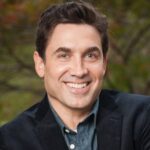
Dr. Sachs is a licensed child psychologist, specializing in the treatment of ADD, ADHD and Autism Spectrum Disorders in children and teens. Dr. Sachs did his diagnostic training at The Child Study Center in Chicago, conducting neuropsychological evaluations of children with ADHD. Dr. Sachs continued his training at Mt. Sinai and Cook County Hospitals in Chicago, conducting therapy and psychological assessments in their Child and Adolescent Psychiatry clinics. At Mt. Sinai Hospital, Dr. Sachs also led a support group for parents of children with ADHD.
Dr. Sachs did his internship and post-doctoral residency at the Children’s Institute (CII) in Los Angeles, concentrating on the diagnosis and treatment of abused and neglected children. While at CII, Dr. Sachs served as a supervising psychologist, mentoring and training therapists in the assessment, diagnosis and evidence-based treatment of children with neurobehavioral disorders.
Dr. Sachs has authored a workbook, Helping the Traumatized Child, to assist new clinicians in the treatment of PTSD in children. This workbook was created to be used in conjunction with TFCBT [Trauma-Focused CBT] and offers the child therapist unique kid-friendly activities to complement the TFCBT model components. This workbook has also been successfully field-tested in Los Angeles at the Children’s Institute.
How do I work as Child Psychologist?
I believe that a careful evaluation is necessary before rushing into a diagnosis. This process can take as little as 50 minutes or 2 to 3 months depending on his severity of the issue and the needs of the child and family. This careful assessment is very important at the beginning of a relationship with the family as an incorrect diagnosis can lead the entire therapeutic process down an unhelpful path.
While a thorough neuropsychological evaluation can be very comprehensive and offer great insight into the child’s strengths and weaknesses, the best method for uncovering the child’s deficits is simply time. It is my opinion that it takes a number of sessions for the child to begin to feel comfortable with the me and begin to reveal more of their true personality.
Once the careful evaluation process has been completed, then it’s time to begin working with the family, the school, and of course the child to enhance their strengths and improve their weaknesses. This is why I subscribe to a holistic approach when treating children. All areas of their life must be considered before treatment can truly be effective. Conversations with their teachers, and their existing psychiatrist if they have one, and of course their parents is very helpful in formulating a positive and supportive environment for change to occur.
I’m a firm believer in managing the expectations of the parents to support improving their child’s weaknesses. In my experience it takes time to impact change. In many cases it takes at least three months for the child to begin to feel comfortable with me and to reveal their true inner self. Once the child begins to trust me then I can have an influence on their lives. This is especially true with teenagers.
I also believe the child must enjoy coming to see me and that this will set the stage for their experience of therapy in general, so that hopefully this will encourage them to continue to see therapists in the future and on into adulthood. All too often I hear of adults that had negative experiences with child psychologists which impact their trust with their current adult psychologist. To that and I work very hard to make therapy interesting and fun for the child. In the past Checkers and Candyland were the tools of the child psychologists. I’ve found that these tools don’t work anymore and that we must continually innovate and meet the child where their interests are—and this often means videos games. I use age appropriate (Wii) video games as a reward for the child to share uncomfortable thoughts and feelings in the session. It is my experience that this keeps the child coming back a week after week and thus allows me a greater opportunity to influence change.
While I am trained as a Cognitive Behavioral Child Psychologist and have used this model in the past to treating traumatized children, I don’t subscribe to this therapeutic model 100% of the time. I believe that a child must be allowed to bring forth what is of interest to them. By allowing them the space to lead the process, I can better understand and uncover their unhelpful thoughts and behaviors.
child psychologist nyc uws
